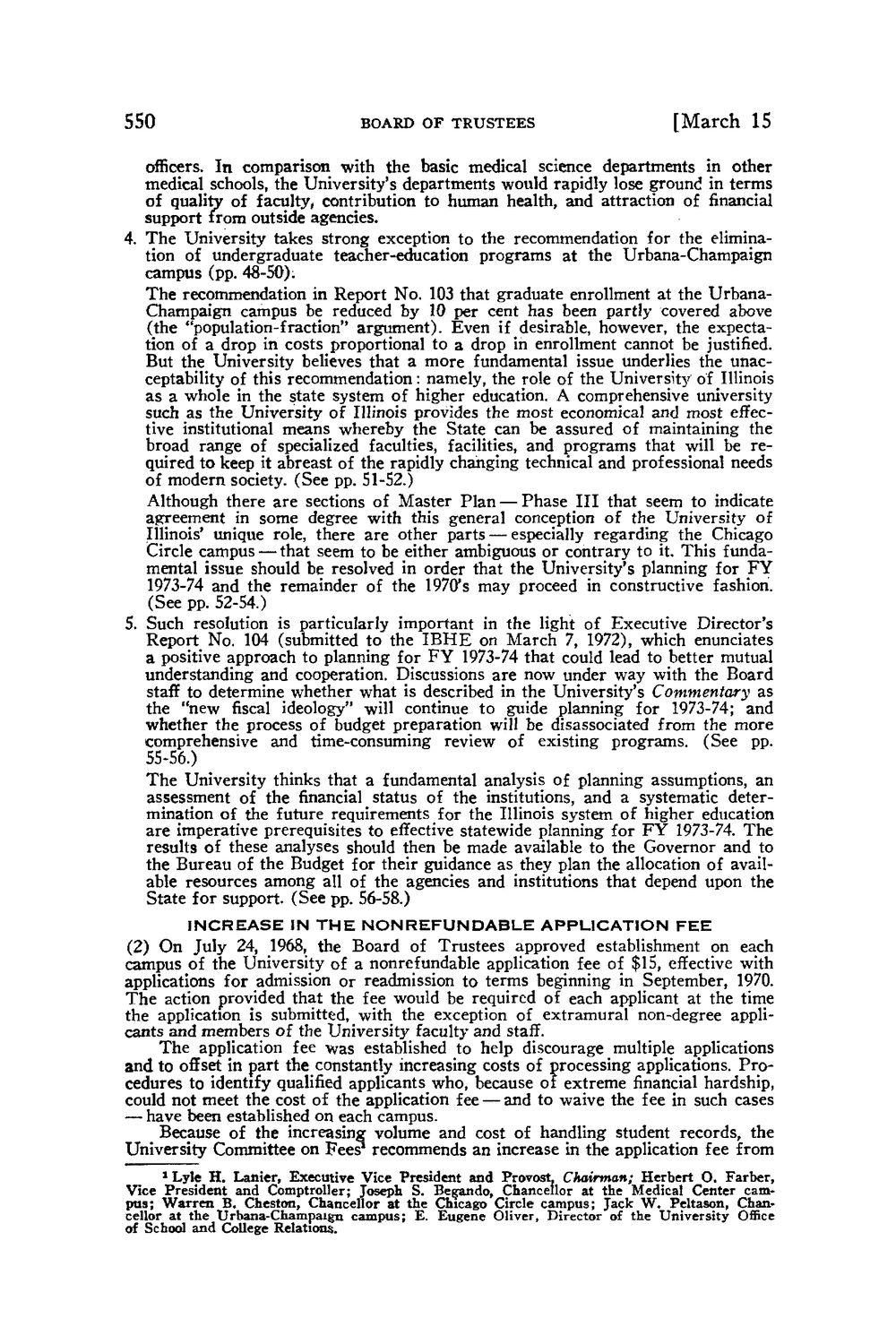| |
| |
Caption: Board of Trustees Minutes - 1972
This is a reduced-resolution page image for fast online browsing.

EXTRACTED TEXT FROM PAGE:
sso BOARD OF TRUSTEES [March 15 officers. In comparison with the basic medical science departments in other medical schools, the University's departments would rapidly lose ground in terms of quality of faculty, contribution to human health, and attraction of financial support from outside agencies. 4. The University takes strong exception to the recommendation for the elimination of undergraduate teacher-education programs at the Urbana-Champaign campus (pp. 48-50). The recommendation in Report No. 103 that graduate enrollment at the UrbanaChampaign campus be reduced by 10 per cent has been partly covered above (the "population-fraction" argument). Even if desirable, however, the expectation of a drop in costs proportional to a drop in enrollment cannot be justified. But the University believes that a more fundamental issue underlies the unacceptability of this recommendation: namely, the role of the University of Illinois as a whole in the state system of higher education. A comprehensive university such as the University of Illinois provides the most economical and most effective institutional means whereby the State can be assured of maintaining the broad range of specialized faculties, facilities, and programs that will be required to keep it abreast of the rapidly changing technical and professional needs of modern society. (See pp. S1-S2.) Although there are sections of Master Plan — Phase III that seem to indicate agreement in some degree with this general conception of the University of Illinois' unique role, there are other parts — especially regarding the Chicago Circle campus — that seem to be either ambiguous or contrary to it. This fundamental issue should be resolved in order that the University's planning for FY 1973-74 and the remainder of the 1970"s may proceed in constructive fashion. (See pp. 52-54.) 5. Such resolution is particularly important in the light of Executive Director's Report No. 104 (submitted to the IBHE on March 7, 1972), which enunciates a positive approach to planning for FY 1973-74 that could lead to better mutual understanding and cooperation. Discussions are now under way with the Board staff to determine whether what is described in the University's Commentary as the "new fiscal ideology" will continue to guide planning for 1973-74; and whether the process of budget preparation will be disassociated from the more comprehensive and time-consuming review of existing programs. (See pp. 55-56.) The University thinks that a fundamental analysis of planning assumptions, an assessment of the financial status of the institutions, and a systematic determination of the future requirements for the Illinois system of higher education are imperative prerequisites to effective statewide planning for FY 1973-74. The results of these analyses should then be made available to the Governor and to the Bureau of the Budget for their guidance as they plan the allocation of available resources among all of the agencies and institutions that depend upon the State for support. (See pp. 56-58.) INCREASE IN THE N O N R E F U N D A B L E APPLICATION FEE (2) On July 24, 1968, the Board of Trustees approved establishment on each campus of the University of a nonrefundable application fee of $15, effective with applications for admission or readmission to terms beginning in September, 1970. The action provided that the fee would be required of each applicant at the time the application is submitted, with the exception of extramural non-degree applicants and members of the University faculty and staff. The application fee was established to help discourage multiple applications and to offset in part the constantly increasing costs of processing applications. Procedures to identify qualified applicants who, because of extreme financial hardship, could not meet the cost of the application fee — and to waive the fee in such cases — have been established on each campus. Because of the increasing volume and cost of handling student records, the University Committee on Fee? recommends an increase in the application fee from 1 Lyle H. Lanier, Executive Vice President and Provost, Chairman; Herbert O. Farber, Vice President and Comptroller; Joseph S. Begando, Chancellor at the Medical Center campus; Warren B. Cheston, Chancellor at the Chicago Circle campus; Jack W. Peltason, Chancellor at the Urbana-Champaign campus; E. Eugene Oliver, Director of the University Office of School and College Relations.
| |